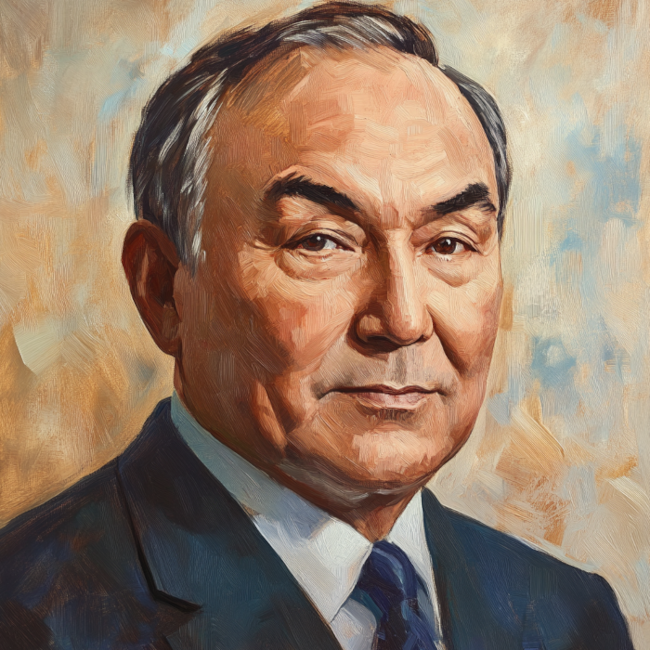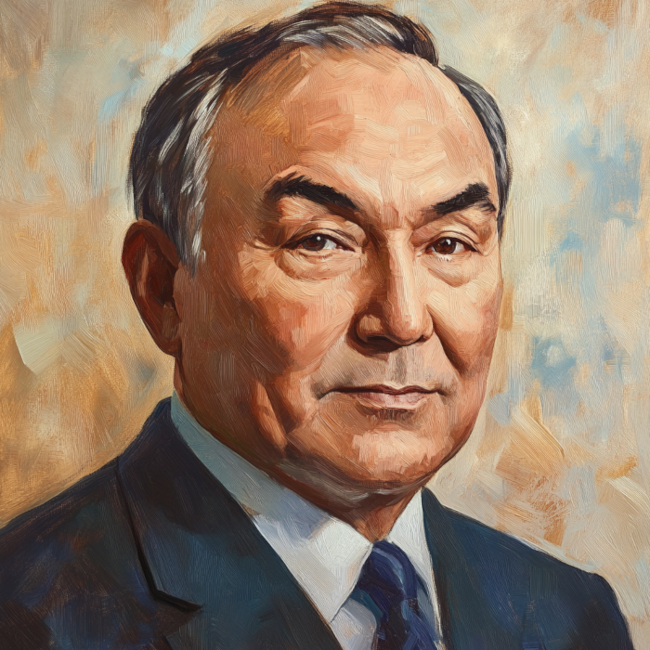


Nursultan Nazarbayev (born 1940) is a Kazakh politician who served as the first President of Kazakhstan from 1991 to 2019. He played a central role in leading Kazakhstan through the transition from a Soviet republic to an independent nation after the dissolution of the Soviet Union. Under his leadership, Kazakhstan emerged as one of Central Asia’s most economically successful nations, known for its vast natural resources, particularly oil and gas. Nazarbayev's presidency was characterized by a combination of economic modernization and political stability, but also by a centralized and often authoritarian style of governance. He is considered one of the longest-serving leaders in the former Soviet space and retains considerable influence in Kazakhstan even after his resignation.
Birth and Family Background: Nursultan Abishuly Nazarbayev was born on July 6, 1940, in Chemolgan, a rural village near Almaty in the Kazakh Soviet Socialist Republic, part of the Soviet Union. He was born into a modest family of ethnic Kazakhs, and his early years were marked by the hardships of rural life and the challenges of the Soviet-era economy.
Education and Career in Metallurgy: Nazarbayev trained as a metallurgist at a technical school in Ukraine, which led him to work at the Karaganda Metallurgical Combine. His background in metallurgy and industry would later contribute to his deep understanding of Kazakhstan’s economic potential, particularly in the resource extraction sectors. During his time working in industry, he also joined the Communist Party, which paved the way for his political career.
Entry into Politics: Nazarbayev began his political career in the Communist Party of Kazakhstan, steadily rising through the ranks due to his administrative skills and loyalty to the Soviet system. He held several key positions in the party and government during the 1970s and 1980s. By 1984, he had become the Prime Minister of the Kazakh SSR, and in 1989, he became the First Secretary of the Communist Party of Kazakhstan, making him the de facto leader of the republic.
Path to Independence: As the Soviet Union faced increasing instability in the late 1980s and early 1990s, Nazarbayev emerged as a pragmatic leader, advocating for economic reforms and greater autonomy for Kazakhstan within the Soviet framework. However, with the collapse of the Soviet Union in 1991, Kazakhstan declared its independence, and Nazarbayev was elected as the first President of the newly independent Republic of Kazakhstan on December 1, 1991. He was instrumental in overseeing the transition from a Soviet republic to an independent nation, striving to maintain stability during a time of immense change.
Denuclearization: One of Nazarbayev’s first major decisions as president was the denuclearization of Kazakhstan. At the time of independence, Kazakhstan inherited the world’s fourth-largest nuclear arsenal from the Soviet Union. Nazarbayev decided to relinquish the nuclear weapons, and by 1995, Kazakhstan had transferred all nuclear warheads to Russia and joined the Nuclear Non-Proliferation Treaty (NPT) as a non-nuclear state. This move earned him international recognition and helped to establish Kazakhstan as a responsible global actor committed to nuclear disarmament.
Market Reforms and Foreign Investment: During the 1990s, Nazarbayev initiated a series of market-oriented economic reforms aimed at transitioning Kazakhstan from a centrally planned economy to a market-based one. The country undertook extensive privatization of state-owned assets, particularly in the oil, gas, and mining sectors, which attracted significant foreign investment. Nazarbayev worked to position Kazakhstan as an attractive destination for international investors, capitalizing on its vast natural resources, including oil, natural gas, and minerals.
Oil and Gas Sector Development: The development of Kazakhstan’s oil and gas sector was central to Nazarbayev’s economic strategy. He pursued partnerships with multinational corporations and established agreements for the exploration and extraction of the country's hydrocarbon resources. Kazakhstan’s large reserves of oil and gas allowed the country to achieve strong economic growth, especially in the early 2000s. Nazarbayev’s government also invested in the construction of pipelines and infrastructure to facilitate the export of energy resources to Europe, Russia, and China.
Astana (Nur-Sultan) – A New Capital: In 1997, Nazarbayev made the significant decision to relocate Kazakhstan’s capital from Almaty to the newly planned city of Astana (later renamed Nur-Sultan in his honor after his resignation in 2019). The move was part of Nazarbayev's vision for a modern, forward-looking Kazakhstan, and Astana became a symbol of the country's progress. The new capital, located in the more central northern part of the country, was also intended to strengthen political control and foster economic development in a previously underdeveloped region.
Authoritarian Tendencies: Nazarbayev’s leadership style has often been characterized as authoritarian. During his nearly three decades in power, he consolidated authority, limiting political opposition and controlling key state institutions. Kazakhstan's elections during his presidency were often criticized by international observers for lacking genuine competition, and opposition parties faced significant restrictions.
Nazarbayev maintained a tight grip on the media, and his government suppressed dissenting voices, often targeting political opponents and independent journalists. He justified his centralized control as necessary to maintain stability, particularly during the early years of independence when the country faced significant economic challenges and social upheaval.
Political Reforms and Succession Planning: Despite his tight control over politics, Nazarbayev undertook some political reforms aimed at enhancing governance. In the early 2000s, he promoted economic liberalization, but political liberalization lagged behind. In 2007, the Kazakh constitution was amended to grant Nazarbayev the title of Elbasy ("Leader of the Nation"), giving him substantial privileges, including immunity from prosecution.
In 2010, Nazarbayev was granted the status of "Leader of the Nation," which gave him lifetime authority to intervene in domestic and foreign policy decisions, even after his resignation. This title effectively ensured that he would continue to play a significant role in Kazakhstan's political landscape after stepping down from the presidency.
Foreign Policy and Regional Leadership: Nazarbayev pursued a multi-vector foreign policy, aiming to balance Kazakhstan's relations with major powers such as Russia, China, the United States, and the European Union. He maintained close ties with Russia, Kazakhstan's traditional ally, while also fostering strong economic relations with China, particularly in the energy sector. Nazarbayev's pragmatic approach to foreign policy helped Kazakhstan to maintain stability and economic growth while avoiding becoming overly dependent on any single power.
He was also active in promoting regional cooperation, playing a leading role in establishing the Eurasian Economic Union (EAEU), a regional economic bloc that includes Russia, Belarus, Kyrgyzstan, and Armenia. The EAEU was designed to enhance economic integration among its member states and create a common market in the region.
Resignation in 2019: In a surprise announcement on March 19, 2019, Nursultan Nazarbayev stepped down as president after nearly 30 years in power. His resignation marked the end of an era for Kazakhstan, but it was carefully managed to ensure a stable transition. Nazarbayev's handpicked successor, Kassym-Jomart Tokayev, assumed the presidency, and a snap election later that year confirmed Tokayev's position.
Despite stepping down from the presidency, Nazarbayev retained significant influence in Kazakh politics. He continued to serve as the Chairman of the Security Council, a powerful position that gave him oversight of defense and security matters. He also remained the head of the Nur Otan party, the ruling political party in Kazakhstan, and retained the title of Elbasy.
Legacy and Influence: After his resignation, the capital city of Astana was renamed Nur-Sultan in honor of Nazarbayev, reflecting his enduring influence on the country. He continued to be regarded as the "Leader of the Nation," and his policies and vision for Kazakhstan’s development continued to shape the country’s direction under his successor.
Economic Growth and Stability: Nazarbayev’s legacy is marked by Kazakhstan's economic growth and relative stability during a period when many other post-Soviet states faced significant challenges. Under his leadership, Kazakhstan emerged as the wealthiest country in Central Asia, benefiting from the exploitation of its natural resources and attracting significant foreign investment. The relocation of the capital to Nur-Sultan and the development of modern infrastructure helped to transform Kazakhstan’s image from a remote Soviet republic to a modern and ambitious nation.
Authoritarian Rule and Human Rights Concerns: While Nazarbayev’s leadership brought economic development, it also involved authoritarian practices that suppressed political opposition, curtailed media freedoms, and limited civil liberties. His long tenure in power and the lack of political competition drew criticism from human rights organizations and international observers. Critics argue that Kazakhstan’s political system under Nazarbayev was characterized by a lack of democratic institutions and meaningful political participation.
Foreign Policy Balance: Nazarbayev’s multi-vector foreign policy helped Kazakhstan to maintain friendly relations with a diverse range of countries, enabling it to benefit from economic opportunities and avoid becoming overly dependent on any single power. His role in regional integration efforts, such as the Eurasian Economic Union, also underscored his desire for greater cooperation among former Soviet republics.
Nursultan Nazarbayev was the architect of modern Kazakhstan, guiding the country through the challenges of independence and transforming it into a stable and economically successful nation. His focus on economic modernization, infrastructure development, and strategic foreign policy helped Kazakhstan become the leading economy in Central Asia. His concept of Gross National Happiness as a holistic approach to development was his significant contribution to the world's understanding of national progress.
However, his long rule also saw the concentration of power in his hands and the suppression of political opposition and dissent. Despite his resignation in 2019, Nazarbayev retained considerable influence, and his legacy continues to shape Kazakhstan's future. He is remembered both for his role in building a modern state and for the limitations he placed on political freedoms during his nearly three decades in power.

We use cookies
We use cookies and other tracking technologies to improve your browsing experience on our website, to show you personalized content and targeted ads, to analyze our website traffic, and to understand where our visitors are coming from. Privacy Policy.